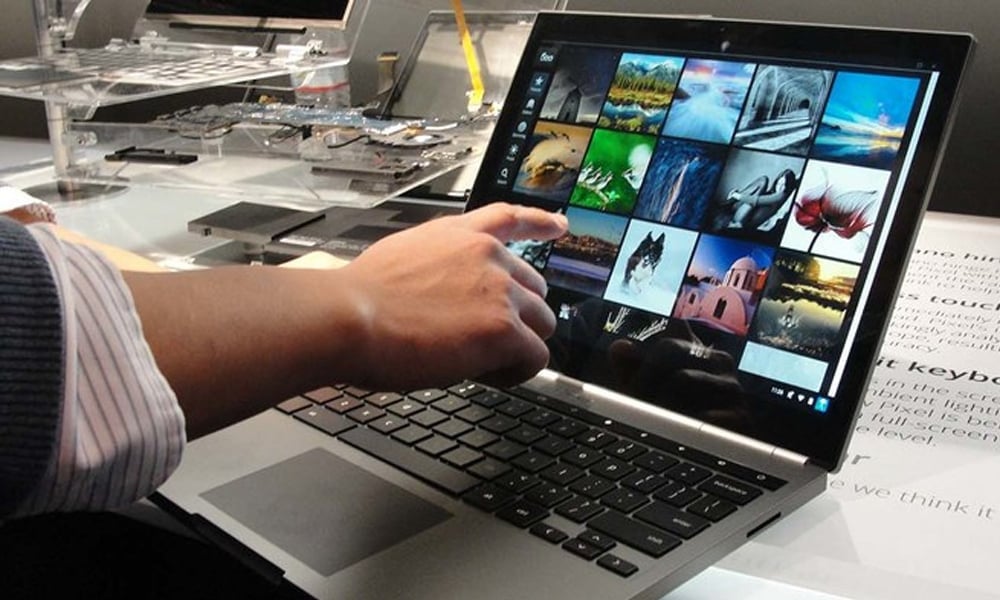
Google launches initiative to produce 0.5m Chromebooks in Pakistan
Global tech giant Google announced a significant initiative to manufacture 500,000 Chromebooks in Pakistan on Thursday. The launch ceremony, held in Islamabad, was marked by presenting the first Chromebook to Prime Minister Shehbaz Sharif. President of Google Asia Pacific Scott Beaumont presented the device to the PM. Farhan Qureshi, Google's Regional Director for Pakistan, Bangladesh, and Sri Lanka, emphasised that focusing on technology would stimulate economic activity in Pakistan. He pointed out the vast opportunities for freelancers in various tech fields to thrive and contribute to the country’s progress. In his address at the event, PM Shehbaz commended Google's contributions globally and within Pakistan. He stressed the potential of the country’s youth in the field of Information Technology (IT), noting their capability to drive Pakistan's economic development. The prime minister called on federal and provincial governments to allocate resources towards the education and empowerment of the younger generation. He also shared the government’s ambitious target of reaching $25 billion in IT exports over the next five years, stating that this goal is within reach. PM Shehbaz urged IT experts and entrepreneurs to develop strategies that would help the government achieve this target, while also promoting the growth of Small and Medium Enterprises (SMEs) and freelancers. He reaffirmed the government's commitment to digitising Pakistan’s governance systems, aiming for a paperless and corruption-free administration. The prime minister highlighted the recent hiring of a new Secretary for the Ministry of IT and Telecommunication, a move he said was made through a transparent process. State Minister for Information Shaza Fatima Khawaja acknowledged Google’s vital role in advancing Pakistan's digitisation efforts under the vision of PM Shehbaz. This initiative reflects Google's commitment to supporting Pakistan's digital transformation and fostering economic growth through technological advancement.

Global tech giant Google announced a significant initiative to manufacture 500,000 Chromebooks in Pakistan on Thursday. The launch ceremony, held in Islamabad, was marked by presenting the first Chromebook to Prime Minister Shehbaz Sharif. President of Google Asia Pacific Scott Beaumont presented the device to the PM. Farhan Qureshi, Google's Regional Director for Pakistan, Bangladesh, and Sri Lanka, emphasised that focusing on technology would stimulate economic activity in Pakistan. He pointed out the vast opportunities for freelancers in various tech fields to thrive and contribute to the country’s progress. In his address at the event, PM Shehbaz commended Google's contributions globally and within Pakistan. He stressed the potential of the country’s youth in the field of Information Technology (IT), noting their capability to drive Pakistan's economic development. The prime minister called on federal and provincial governments to allocate resources towards the education and empowerment of the younger generation. He also shared the government’s ambitious target of reaching $25 billion in IT exports over the next five years, stating that this goal is within reach. PM Shehbaz urged IT experts and entrepreneurs to develop strategies that would help the government achieve this target, while also promoting the growth of Small and Medium Enterprises (SMEs) and freelancers. He reaffirmed the government's commitment to digitising Pakistan’s governance systems, aiming for a paperless and corruption-free administration. The prime minister highlighted the recent hiring of a new Secretary for the Ministry of IT and Telecommunication, a move he said was made through a transparent process. State Minister for Information Shaza Fatima Khawaja acknowledged Google’s vital role in advancing Pakistan's digitisation efforts under the vision of PM Shehbaz. This initiative reflects Google's commitment to supporting Pakistan's digital transformation and fostering economic growth through technological advancement.
